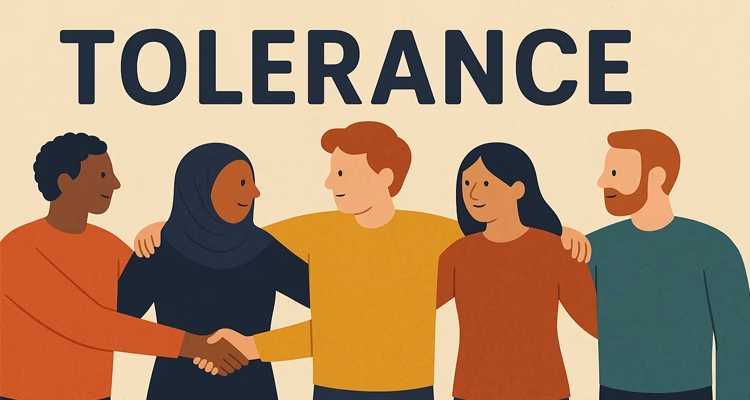 It is often said that “tolerance is respect, acceptance, and appreciation of the rich diversity of our world’s cultures, our forms of expression, and our ways of being human.” Tolerance can be understood as a fair and objective attitude toward people of different races, religions, nationalities, beliefs, or ideas. It is the ability to accept and respect differences in others, even when we disagree with their views. In a diverse society, tolerance becomes a fundamental virtue that promotes harmony, understanding, and peaceful coexistence.
It is often said that “tolerance is respect, acceptance, and appreciation of the rich diversity of our world’s cultures, our forms of expression, and our ways of being human.” Tolerance can be understood as a fair and objective attitude toward people of different races, religions, nationalities, beliefs, or ideas. It is the ability to accept and respect differences in others, even when we disagree with their views. In a diverse society, tolerance becomes a fundamental virtue that promotes harmony, understanding, and peaceful coexistence.
Tolerance is the hallmark of a civilized age. It enables us to accommodate those whose ways of life, opinions, or worldviews differ from ours. It teaches us to see the other side of every issue, to deal patiently with ignorance, and to engage with zealots or fanatics without losing our composure. However, tolerance should not be mistaken for weakness. It has its limits—beyond which it may even become a social harm. True tolerance is most effective in the everyday interactions of life, where mutual respect and understanding matter most.
Fundamentally, tolerance is a struggle for peace. It demands policies that respect diversity and uphold human rights. More importantly, it calls upon each of us—women and men across the world—to embrace tolerance in our daily lives: by trying to understand others, rejecting hatred, and standing firmly against racism, bigotry, and anti-Semitism.
Practicing tolerance involves active listening, empathy, open-mindedness, and the courage to speak up against injustice. But it also requires overcoming deep-seated prejudice, ignorance, and fear—challenges that each society must tackle collectively.
The true significance of tolerance lies in its ability to broaden the human mind. It enables us to accept diverse ideas, expand our knowledge, and develop personal freedom of thought and judgment. It also helps us understand other people’s beliefs and perspectives more deeply.
Human rights advocates often use International Day for Tolerance to highlight the need for laws that prohibit hate crimes and discrimination against minorities. Workplaces also conduct awareness programs and leadership messages to emphasize the importance of inclusion and acceptance.
Unfortunately, intolerance continues to fuel racial tension and social divides. As long as envy, greed, jealousy, and malice dominate human behavior, tolerance remains fragile. Modern times have witnessed the weakening of long-established social and family values. Rising materialism and consumerism have eroded essential human values. Individualism has grown so sharply that anything challenging one’s personal notions is often rejected outright.
We must remember that tolerance is not merely an abstract ideal—it holds immense significance in daily life. Humans are social beings who must coexist with others in a spirit of cooperation. This requires compromise, flexibility, and the willingness to give and take. A rigid, prejudiced mind can never be truly tolerant.
Ultimately, tolerance is an act of humanity—one that we must nurture every day. It invites us to celebrate diversity and cherish the shared values that bind us. Tolerance enriches our lives and strengthens our societies. By embracing differences and promoting acceptance, we can build a more harmonious, inclusive world. Let us strive to practice tolerance in our daily lives, fostering a culture rooted in understanding and respect.
(Written by Vinod Chandrashekhar Dixit)




